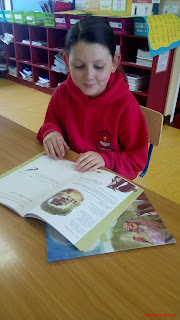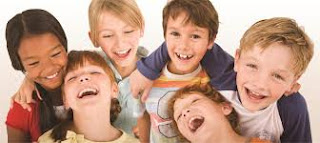For many parents, raising happy children is the holy grail of parenting success. But too often, we think happiness is about those fleeting moments of getting what you want. Lasting happiness is actually much more complicated, but much more rewarding. And yes, you can dramatically increase your child's chances of being happy, just by the way you raise him or her.
What makes a happy child who grows into a happy adult? Since happiness is a by-product of emotional health, emotional intelligence and taught coping skills, these are key factors in our
Buddy Bench Aware programmes.
What do you need to be happy?
The latest research on happiness gives us surprising answers. Happiness turns out to be less a result of luck and external circumstance than a product of our own mental, emotional, and physical habits, which create the body chemistry that determines our happiness level.
We all know that some of us tend to be more upbeat than others. Part of this is inborn, just the fate of our genes that give us a happier mood. But much of our mood is habit.
It may seem odd to have happiness referred to as a habit. But it's likely that by the time we're adults, we have settled into the habit of often being happy, or the habit of being largely unhappy.
Happiness is closely linked to three kinds of habits:
1. How we think and feel about the world, and therefore perceive our experiences.
2.Certain actions or habits, such as regular exercise, eating healthfully, meditating, connecting with other people, even -- proven in study after study -- regularly smiling and laughing!
3.Character traits such as self-control, industry, fairness, caring about others, citizenship, wisdom, courage, leadership, and honesty.
In practice, these character traits are just habits; tendencies to act in certain ways when confronted with certain kinds of situations. And certainly it makes sense that the more we exhibit these traits, the better our lives work and the better we feel about ourselves, so the happier we are.
Some of the habits that create happiness are visible, the ways Granny told us we ought to live: work hard, value relationships with other people, keep our bodies healthy, manage our money responsibly, contribute to our community.
Others are more personal habits of self management that insulate us from unhappiness and create joy in our lives, such as managing our moods and cultivating optimism. But once we make such habits part of our lives, they become automatic and serve a protective function.
How can you help your child begin to develop the habits that lead to happiness?
1. Teach your child constructive habits to manage his mind and thoughts to create happiness:
Managing our moods, positive self-talk, cultivating optimism, celebrating life, practicing gratitude, and appreciating our connected-ness to each other and the entire universe. Build these into your life together so you model them regularly, talk about using them, and your child will copy you.
2. Teach your child the self-management habits that create happiness:
Regular exercise, healthy eating, and meditation are all highly correlated with happiness levels. But you and your child may have your own, more personal strategies; for many people music is an immediate mood lifter, for others a walk in nature always works.
3. Cultivate fun.
The old saying that laughter is the best medicine turns out to be true. The more we laugh, the happier we are! It actually changes our body chemistry. So the next time you and your child want to shake off the doldrums, how about a good comedy?
And here’s a wonderful tool: smiling makes us happier, even when we initially force it. The feedback from our facial muscles informs us that we’re happy, and immediately improves our mood. Not to mention the moods of those around us-- so that feedback loop uplifts everyone.
4. Help him learn how to manage his moods.
Most people don’t know that they can choose to let bad moods go and consciously change their moods. But practice in doing this can really make us happier. Of course, we aren't talking about denial. The first step is always to acknowledge the upset feelings, and let ourselves feel them. So with your child, simply empathizing with her upset feelings will help them start to evaporate.
But there are times when we just stay in a bad mood, rather than nurturing ourselves through the upset, or choosing to change it. That's just a habit that our brain has gotten into. If you can practice monitoring your own moods and shifting them, through acknowledging the feelings, allowing yourself to feel the emotions, correcting any negative thoughts that are giving rise to the emotions, and nurturing yourself, you'll be re-wiring your brain. And as you practice this and get better at it, you can teach these skills to your child.
Of course, the hard part is choosing to change a bad mood. While you're in it, it's hard to take constructive action to change things. You don't have to go from desolate to cheerful. Just find a way to help yourself feel slightly better. That empowers you to actually face what's upsetting you, and try to solve it. Sometimes just changing our the way we're thinking about a situation really shifts things.
How to help your child with her moods? Sometime when she's in a good mood, talk with her about strategies for getting into a better mood: what works for her? Share what works for you. Then, when she’s in a bad mood, start by empathizing. After she's had some time to feel her upset, ask her if she wants help to change her mood. Even if she’s able to choose a better mood only one out of ten times initially, she’ll soon start to notice how much better her life works when she does it.
5. Model positive self- talk.
We all need a helper sometime to get us us over life’s many hurdles. Who says we can’t be our own? In fact, who better? Research shows that happy people give themselves ongoing reassurance, acknowledgment, praise and pep talks.
6. Cultivate optimism...
...it inoculates against unhappiness. It’s true that some of us are born more optimistic than others, but we can all cultivate it.
7. Help your child find joy in everyday things.
Studies show that people who notice the small miracles of daily life, and allow themselves to be touched by them, are happier. Daily life overflows with joyful occurrences: The show of the setting sun, no less astonishing for its daily repetition. The warmth of connection with the man at the newsstand who recognizes you and your child. The joy of finding a new book by a favourite author at the library. A letter from family member or friend. The first crocuses of spring.
As Albert Einstein said,
"There are only two ways to live your life. One is as though nothing is a miracle. The other is as though everything is a miracle."
Children learn by our example what's important in life.
8. Support your child to prioritize relationships.
Research shows that people who are happiest have more people in their lives, and deeper relationships with those people. Teach your child that while relationships take work, they're worth it.
9. Help your child develop gratitude.
"We tend to forget that happiness doesn't come as a result of getting something we don't have, but rather of recognizing and appreciating what we do have." -- Frederick Keonig
Many people think they can't be grateful until they're happy, meaning until they have something to be grateful for. But look closely and you'll find that it's the opposite: people are happy because they are grateful. People who describe themselves as consciously cultivating gratefulness are rated as happier by those who know them, as well as by themselves.
Children don’t have a context for life, so they don’t know whether they are lucky or unlucky, only that their friend Brendon has more expensive runners or Sofia has a pony. But there are many ways to help children learn to cultivate gratitude, which is the opposite of taking everything for granted.
(Hint: Think modelling, not lecturing).
10. Counteract the message that happiness can be bought.
 |
| Buddy Bench Aware |
As parents, we need to remember that we are not the only ones teaching our children about life. They get the constant media message that the goal of life is more money and more things. Ultimately, what we model and what we tell them will matter more, but we need to confront those destructive messages directly.
11. Leave room for grief.
Life is full of joy, but even for the happiest person it is also full of loss and pain, and we have daily reasons to grieve, large and small. Acknowledging our sad feelings isn't focusing on the negative, it's opening ourselves to the full range of being human. Accepting those uncomfortable sad feelings actually deepens our ability to take joy in our lives. Choosing to be happy doesn't mean repressing our feelings. It means acknowledging and honoring our feelings, and then letting them go.
12. Help your child learn the joy of contribution.
Research shows that the pride of contributing to the betterment of society makes us happier, and it will make our children happier too. Our job as parents is to find ways for them to make a positive difference in the world so they can enjoy and learn from this experience.
Enjoy your children and of course be happy!
The Buddy Bench Team




























